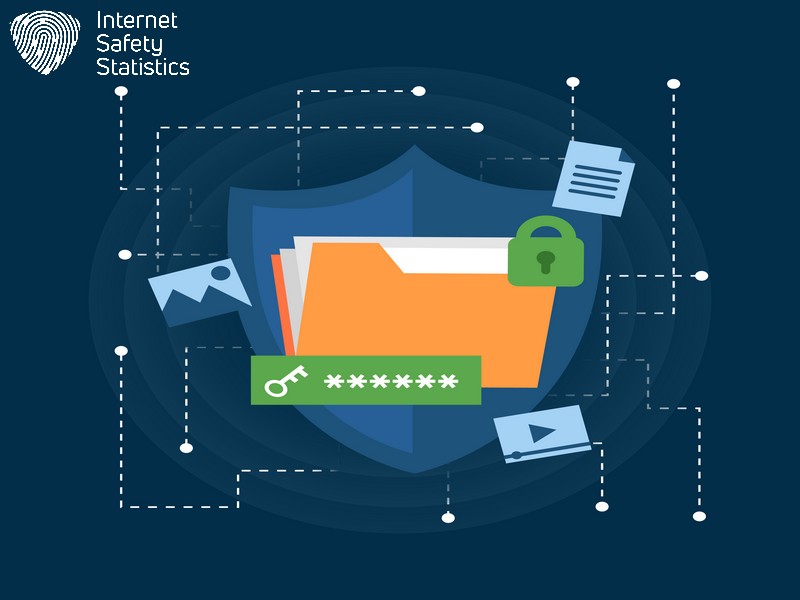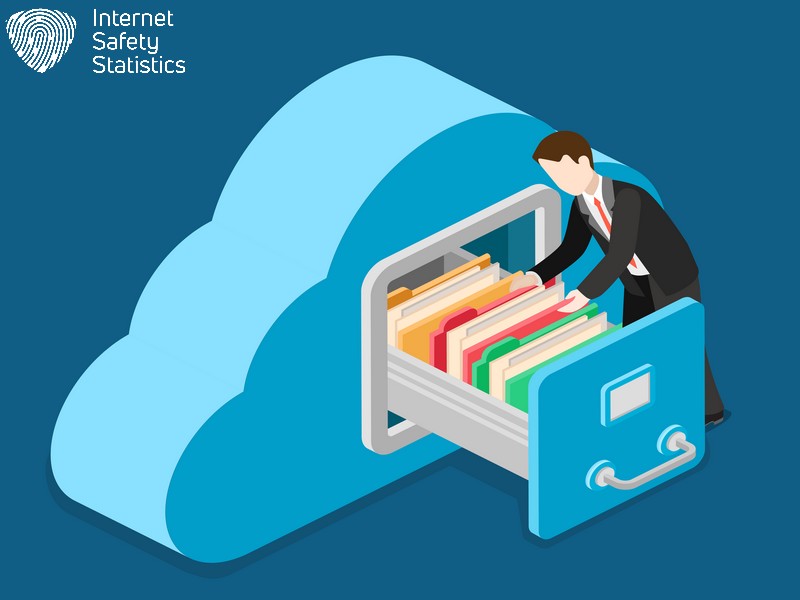
Struggling to keep your files safe and secure? You’re not alone. With the rise of digital information sharing, the need for reliable file-sharing and storage solutions has never been more critical. In this blog, we’ll explore the world of secure file-sharing and storage solutions, offering insights into best practices and popular services that can help keep your data protected.
Get ready to take control of your digital privacy!
Why Secure File-Sharing and Storage Solutions?

Secure file sharing and storage means keeping your digital files safe when you send them to someone else or keep them in the cloud. It’s all about protecting these files from uninvited eyes, ensuring only the right people can get to them.
Think of it as sending a letter with a special lock only the recipient has the key for, except it’s all done digitally. Parents share photos, office workers send documents, and we all want our online details kept private.
Choosing secure methods and following best practices make this possible. You might use encrypted email, where your messages are scrambled until they reach their destination, or opt for virtual data rooms that tightly guard sensitive business information.
Cloud storage services let you save files online to access them anywhere. They are handy for collaboration and ensure nothing gets lost if a device breaks down or goes missing. With cyber threats on the rise, securing every click and swipe is not just smart; it’s essential to maintain privacy protection and data security in our interconnected world.
Importance of Secure File-Sharing and Storage Solutions
As we delve deeper into modern communication methods, the significance of secure file-sharing and storage solutions comes sharply into focus. In an age where data breaches are a frequent headline, safeguarding our digital information is not just prudent but essential.
These solutions ensure that personal photos, sensitive work documents, and confidential communications remain protected from unauthorised access. Parents can rest easier knowing their family‘s digital memories are safely stored, while office workers can collaborate with colleagues without fearing their data might fall into the wrong hands.
Using secure file transfer protocols and cloud storage services allows for not only the safekeeping of files but also facilitates ease of access across devices—vital for today’s on-the-go lifestyle.
For businesses, deploying these secure systems means compliance with strict regulations to prevent costly penalties and loss of trust. The scalability of cloud-based options presents an added advantage; companies pay only for what they need, thus managing resources effectively as they expand. This strategic approach to handling sensitive information reflects a commitment to cybersecurity and builds a foundation of reliability in all forms of online collaboration and communication.
Secure File-Sharing Methods
This section will cover various methods for secure file sharing, including encrypted email, secure file transfer protocols, cloud storage services, encrypted messaging apps and virtual data rooms.
Encrypted Email
Encrypted email provides a secure way to send sensitive information over the Internet. Only the intended recipient can access the content, protecting it from hackers or unauthorised parties. By using encryption methods, such as PGP (Pretty Good Privacy) or S/MIME (Secure/Multipurpose Internet Mail Extensions), emails are transformed into unreadable code which can only be deciphered by those with the correct decryption key. This adds an extra layer of security and privacy to your digital communication, making it an essential tool for safeguarding confidential data.
Businesses and individuals can benefit from incorporating encrypted email into their communication practices. For office workers handling sensitive company information or parents sharing personal data online, using encrypted email is crucial in maintaining data security and ensuring that private messages remain private.
Secure File Transfer Protocols
Secure file transfer protocols ensure that files are transmitted securely between parties. These protocols use encryption to protect the data during transit, safeguarding it from unauthorised access or interception. Implementing secure file transfer protocols is crucial for maintaining the confidentiality and integrity of sensitive information, providing peace of mind for both businesses and individuals.
Secure file transfer protocols are essential in today’s digital landscape to prevent data breaches and uphold privacy standards. By following these best practices, you can confidently share files, knowing they are protected throughout transmission.
Cloud Storage Services
Cloud storage services offer a convenient and secure way to store and access files from anywhere with an internet connection. Users can seamlessly upload, download, and share files while ensuring data security and backup. These services provide scalability, cost-effectiveness, and flexibility for businesses and individuals who need reliable file storage solutions.
With cloud storage, users can easily synchronise files across devices, collaborate on documents in real time, and access their data anytime. Additionally, cloud providers often employ advanced encryption methods to protect sensitive information from unauthorised access or breaches.
Encrypted Messaging Apps
Encrypted messaging apps offer a secure way to communicate and share files, ensuring your data remains confidential and protected from unauthorised access. These apps use advanced encryption techniques to safeguard your messages and attachments, giving you peace of mind when exchanging sensitive information with colleagues or friends. With the increasing focus on data privacy and protection, encrypting messaging apps can significantly enhance your overall security posture.
As technology continues to evolve, so do the methods for keeping our digital communications safe. Encrypted messaging apps play a crucial role in upholding data privacy and security standards, providing protection in today’s interconnected world.
Virtual Data Rooms
Moving on from secure messaging apps, another top-tier solution for secure and efficient file sharing is virtual data rooms. These online repositories or cloud-based storage systems allow businesses to store and share sensitive information with external parties securely. Virtual data rooms are commonly used during financial transactions, legal processes, and any other scenario where confidentiality is required for sharing documents.
Virtual data rooms also provide access control restrictions, enabling organisations to manage who can view, download, or edit specific files. They offer advanced document encryption features to safeguard against unauthorised access and ensure data security throughout file-sharing.
Best Practises for Secure File Sharing
Choose reputable services, use encryption, practice least privilege access, employ multi-factor authentication, and keep software and systems updated. Read on to discover more about ensuring the security of your files.
Choose Reputable Services
To ensure the security of your files, select services from well-established and reputable providers. Look for companies with a proven track record in data security and encryption. Seek out reviews and testimonials from other users to gauge their reliability.
Verify that the service employs robust encryption methods and is committed to maintaining high levels of security. Additionally, compliance certification or industry recognition should be considered an indicator of the field’s trustworthiness.
When considering secure file-sharing solutions, it’s crucial to prioritise reputation and reliability to safeguard your sensitive information effectively. Next, let’s delve into the importance of encryption for secure file sharing.
Use Encryption
To ensure the security of your shared files, use encryption. This technology scrambles data so only authorised parties can access it, adding a layer of protection against unauthorised access. Encryption is essential for safeguarding sensitive information during file-sharing and storage activities.
Incorporating encryption into your file-sharing methods can significantly reduce the risk of data breaches and unauthorised access. In addition to choosing reputable services, employing encryption is crucial in fortifying your data security efforts. This powerful tool ensures that your files remain confidential and secure throughout their journey across various platforms and networks.
Practice Least Privilege Access
To ensure robust data security, it is crucial to practise least privilege access. This means granting users the minimum level of access required for them to carry out their tasks effectively. By limiting access rights, businesses can reduce the risk of unauthorised data breaches and internal misuse of sensitive information. Additionally, implementing least-privilege access helps organisations maintain control over their data and prevent potential security vulnerabilities.
As we delve into best practices for secure file sharing, we must consider employing multi-factor authentication further to fortify your data protection measures against potential threats.
Employ Multi-Factor Authentication
To fortify data security, in addition to practising least privilege access, it is crucial to employ multi-factor authentication. This adds an extra layer of protection by requiring users to provide two or more verification forms before gaining access.
By combining something the user knows (like a password) with something they have (like a fingerprint or a unique code sent to their mobile device), multi-factor authentication significantly reduces the risk of unauthorised access and potential data breaches.
Implementing multi-factor authentication enhances the security of your accounts and files and provides peace of mind for both individuals and businesses. It’s a simple yet effective way to add a shield against cyber threats, safeguarding sensitive information from falling into the wrong hands.
Keep Software and Systems Updated
Regularly updating software and systems is crucial to ensuring secure file-sharing and storage solutions. Updated software helps protect against the latest security threats and vulnerabilities, reducing the risk of unauthorised access to sensitive data. You can strengthen your defences and maintain a secure file environment by staying current with updates.
Ensuring that all software and systems are updated also helps improve overall system performance, providing a smoother experience when accessing and transferring files. Additionally, up-to-date systems offer enhanced features contributing to better functionality and usability, benefiting individuals and businesses relying on secure file-sharing solutions.
Legal and Compliance Considerations
Share links, not files, to maintain control over access and usage of sensitive information. To learn more about navigating the world of secure file sharing and storage solutions, keep reading for valuable insights and recommendations.
Share Links, Not Files
Use secure links instead of sharing actual files to ensure better data protection and confidentiality. This practice enhances security by reducing the risk of unauthorised access or accidental distribution of sensitive information. With this approach, only authorised individuals with the link can access the file, increasing control over who views it.
Opting for link sharing also allows for easier tracking and management of file access, enabling organisations to monitor who has opened or downloaded the shared content. Embracing this method aligns with best practices for secure file sharing, helping users uphold data security standards while maintaining efficient collaboration and communication within a protected environment.
Regularly Review and Update Policies
Regularly reviewing and updating policies is essential to enhance the effectiveness of secure file sharing and storage. Here are some key considerations for this practice:
- Stay informed about the latest data security trends and regulatory changes to ensure policies remain relevant.
- Conduct regular audits of existing policies to identify potential weaknesses or gaps in data protection protocols.
- Collaborate with key stakeholders to gather insights and perspectives to inform policy updates.
- Document all policy revisions and communicate them clearly across the organisation to ensure widespread awareness.
- Implement a structured schedule for policy reviews and updates to maintain a proactive approach towards data security.
Stay Deal-Ready
Ensure your legal and compliance policies are current, allowing you to share files quickly. Regularly reviewing and updating these policies will keep you deal-ready for any business transaction or collaboration requiring secure file sharing. Remember the importance of data security best practices like encryption and multi-factor authentication to stay prepared for future opportunities.
Having a reliable and reputable secure file-sharing service is crucial when staying deal-ready. You can confidently navigate potential deals without compromising data security by choosing a well-established provider with robust encryption and access control features.
Popular File Sharing Solutions

Dropbox, Egnyte, Google Drive, SecureDocs and OneDrive are some of the most popular file-sharing solutions in the market today. These platforms offer secure and efficient ways to share and store files, making them essential tools for individuals and businesses.
Dropbox
Dropbox offers a user-friendly platform for secure file sharing and cloud storage solutions. Its seamless interface allows users to upload, share easily, and access files from any device with an internet connection.
The encrypted file-sharing methods employed by Dropbox ensure that data remains protected and confidential during transmission. This makes it a convenient option for parents looking to securely share family photos or documents, office workers collaborating on projects, or internet users seeking a reliable cloud storage solution.
As organisations increasingly prioritise data security, Dropbox’s secure file transfer protocols and encryption features provide peace of mind when handling sensitive information. Its accessibility across various devices allows for efficient file synchronisation while maintaining high levels of security.
Egnyte
Moving on from Dropbox, another popular file-sharing solution worth considering is Egnyte. With strong encryption and robust access controls, Egnyte offers a secure platform for businesses to share and store their files. Companies can ensure that their data remains confidential and compliant with legal regulations by employing multi-factor authentication and regular policy reviews.
Egnyte’s scalable cloud-based storage also makes it an ideal choice for growing businesses, allowing them to pay only for the storage they need. This ensures cost-efficiency while maintaining high levels of security.
Google Drive
Google Drive is a popular cloud storage service that allows users to store and share files securely. With data encryption and multi-factor authentication, Google Drive provides reliable protection for confidential information. Users can easily access their files from any device with an internet connection, making it a convenient solution for personal and professional use. The scalability of Google Drive ensures businesses can expand their storage as needed, offering a cost-effective option for growing organisations.
For parents, office workers, and internet users seeking a user-friendly file-sharing platform with robust security measures, Google Drive is an accessible choice. Its intuitive interface makes navigating files seamless while safeguarding sensitive data against unauthorised access.
SecureDocs
Moving from discussing popular file-sharing solutions like Google Drive to exploring another option, SecureDocs offers businesses a secure and user-friendly virtual data room. With document encryption, granular access controls, and activity tracking, SecureDocs ensures that sensitive information remains protected during collaboration and due diligence processes.
This solution is precious for organisations looking to securely share confidential documents with external parties while maintaining full control over access permissions.
SecureDocs is especially beneficial for businesses seeking a scalable and cost-effective way to securely store and share sensitive data. Its convenient interface makes it easy for users to navigate the platform while adhering to best practices for secure file sharing under compliance regulations.
OneDrive
OneDrive is a popular cloud storage service that allows users to store, share, and access files from anywhere. It offers seamless integration with Microsoft Office applications, making it easy to work on documents collaboratively.
With OneDrive, you can easily share files with specific people or publicly, ensuring secure data transfer without compromising confidentiality. The platform also provides robust data security solutions such as encryption of files at rest and in transit, adding an extra layer of protection for your important documents.
An essential feature of OneDrive is its file access control, allowing users to set permissions for who can view or edit shared files. This helps maintain secure communication and prevents unauthorised access to sensitive information.
Additionally, by regularly updating policies and staying deal-ready in compliance considerations, businesses and individuals can ensure their data remains confidential and secure when using OneDrive for file sharing.
Recap of the Importance of Secure File-sharing and Storage Solutions

Secure file-sharing and storage solutions are paramount for safeguarding sensitive information. Implementing secure methods, such as encrypted email, secure file transfer protocols, and cloud storage services, ensures that data remains protected from unauthorised access.
Users can fortify their data security by adhering to best practices like choosing reputable services, using encryption, and employing multi-factor authentication. Legal and compliance considerations are crucial in ensuring the confidentiality of shared files.
To make informed decisions regarding data access control, it’s essential to stay informed about popular secure file-sharing solutions like Dropbox, Egnyte, Google Drive, SecureDocs, and OneDrive.
Maintaining the integrity of confidential information is imperative when navigating the world of secure file-sharing and storage solutions. As technology advances rapidly with increasing reliance on digital communication tools for various purposes, securing data has become even more critical in today’s interconnected world.
Final Thoughts and Recommendations
Recapping the importance of secure file-sharing and storage solutions, it is crucial to carefully consider the methods and practices for securely transferring files, especially when dealing with sensitive or confidential information.
As organisations increasingly rely on cloud-based secure file-sharing services and virtual data rooms, it’s essential to prioritise encryption, choose reputable services, and enforce multi-factor authentication to fortify data security.
For parents, office workers, and internet users, staying informed about the best practices for secure file sharing can ensure peace of mind when exchanging important files.
When selecting a secure file-sharing solution, remember to assess its compliance with legal standards and regularly review policies to stay deal-ready. Also, remember that secure file transfer protocols can help maintain confidentiality across various platforms.
In conclusion, navigating the world of secure file-sharing and storage solutions is crucial in today’s digital age. By implementing best practices and choosing reputable services, individuals and businesses can ensure that their sensitive information remains protected.
FAQs
1. What are secure file-sharing protocols?
Secure file-sharing protocols are the rules and methods to transfer files safely over the internet or within networks, protecting data from unauthorised access.
2. How can I ensure my files are transferred securely?
You can ensure secure file transfer using trusted methods like encrypted email attachments or secure cloud services that follow best security practices.
3. Why is it important to follow secure file-sharing best practices?
Following secure file-sharing best practices is essential for protecting sensitive information from cyber threats and maintaining privacy when sending or storing files online.
4. Can you give me some tips on navigating storage solutions?
When navigating storage solutions, look for those with robust encryption, two-factor authentication, and a clear privacy policy to keep your stored files safe and sound.
